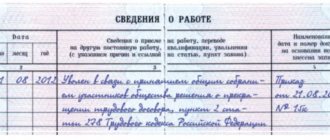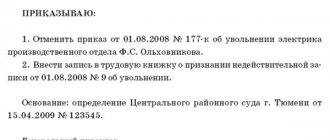Transfer of an employee to the position of director of an LLC: legal gaps
The transfer to the position of director of a person who is an existing employee of the company is a procedure implemented in the jurisdiction of two different branches of legislation - labor and civil.
When considering the legal norms enshrined in them, one can observe the presence of a number of obvious gaps in the legal norms - regarding the regulation of the transfer of an existing employee of the company to the position of general director in an LLC. Namely:
1. The term of office of the director of an LLC: if its establishment is not within the competence of the board of directors of the business company, then it cannot exceed the period specified in the organization’s charter.
At the same time, the charter cannot reflect an indefinite period (Clause 1, Article 40 of the Law “On LLC” dated 02/08/1998 No. 14-FZ, Article 190 of the Civil Code of the Russian Federation).
Thus, on the one hand, concluding an open-ended employment contract with the director of an LLC is not prohibited by labor legislation (Article 59 of the Labor Code of the Russian Federation), on the other hand, if his term of office is limited, concluding such an agreement is inappropriate (since, without authority, the director will not be able to fulfill his duties). duties, his signatures will be illegal).
2. Initially, an employee of an enterprise can work on a permanent employment contract. Transfer from it to an urgent one, to which there is no alternative when hiring an LLC director in the general case, the courts tend to consider as an illegal procedure (appeal ruling of the Irkutsk Regional Court dated August 16, 2013 in case No. 33-6746/13).
Taking into account this peculiarity of the relationship between legislative norms, as well as the position of the courts, we will consider possible legal scenarios for the transfer of an existing employee of an enterprise to the position of director.
Principles for drawing up job descriptions
Since the main aspects of the instructions are not specified by law, employers have the opportunity to draw up a document to suit their own needs. In practice, informal standards for writing a document are used. In its typical form, it includes 4 mandatory sections that define the key aspects of the employee’s activities:
- Main section.
- Functions.
- Rights.
- Responsibility.
Additionally, 1-3 more sections can be added here, specifying certain aspects of the executive director’s activities. This position is present only in large companies that use extended job descriptions as standard.
Although the position is not mentioned in domestic legislation, abroad the position of executive director is ubiquitous in large companies, which opens up the opportunity to use advanced international business practices to describe aspects of the functioning of designated employees.
Main section
A basic section that sets out the requirements for the candidate based on his skills and qualifications. The section also describes the procedure for replacing the executive director, to whom he reports and by whom he is appointed to the position. Most of the items are standard, with the exception of the list of skills, which are set out in accordance with the needs of a particular company.
In domestic legislation, the position of the executive director is not mentioned, but Article 181 of the Labor Code lists a number of points regarding labor relations with the management team of a legal entity. If an employer wants to more firmly formalize its relationship with the executive director, then it is logical to assign him the status of deputy general director.
Functions
The section is used to list the responsibilities of a top manager. For the executive director, the main responsibilities are the current management of the company and the prompt resolution of issues that arise. All other functions are secondary. In foreign practice, the executive director is the second person in the company, and often replaces the chief executive. Therefore, it makes sense to additionally include the possibility of temporarily replacing the general director.
Responsibility
The section describes cases when a top manager may be held liable for damage caused to the company, failure to fulfill his duties and other violations of corporate standards and applicable laws.
The section does not contain specific penalties, since they are established later, during the relevant proceedings.
Rights
The contents of this section describe the rights of a top manager in the company. The executive director has a very wide range of rights, second only to those of the general director. This situation arises due to the need to quickly resolve issues of the company’s current activities.
Official connections
An additional section that defines the basis of the executive director's relationships with other top managers. The main point of its inclusion is to remove the possibility of work conflicts due to contradictions between managers regarding the distribution of rights and intrusion into the area of their official responsibility.
After drawing up the instructions and its approval by the general director, the candidate for the position must familiarize himself with it. To enter into force, the persons involved affix their signatures. Typically, signatures are placed by the head of the organization, the employee himself, and those persons with whom this appointment was agreed upon. There is no need to stamp the document.
Transfer to the position of director of an LLC de jure: general scenario
Of course, a scenario is possible, it can be conditionally called general, in which a current employee of the LLC will have a fixed-term employment contract for his position. In this sense, there will be no obstacles from the point of view of labor law to the appointment of this employee as General Director in the transfer procedure, which is regulated by the provisions of Art. 72.1 Labor Code of the Russian Federation.
This procedure involves:
1. The founders make a decision to appoint a new general director and reflect this decision in the minutes. If there is 1 owner of the company, then only a resolution issued by him will be required.
2. The conclusion by the company’s personnel service of an additional agreement with the employee regarding the transfer to the position of director (later in the article we will consider the nuances of concluding this agreement with the employee).
See a sample additional agreement to the employment contract on the transfer of an employee to the position of General Director of an LLC for a certain period in ConsultantPlus. Trial access to the legal system is free.
How to transfer a director to another position: procedure, documents
Transfer of the director to another position
Despite the fact that the transfer of a director to another position in the organization is carried out in a general manner, the procedure for transferring a director has its own characteristics compared to the official transfer of an ordinary employee. In particular, the employer must document the removal of powers from the director, who is planned to be transferred to another position, as well as the approval of a new candidacy for the director.
Detailed instructions that will help you understand the specifics of documenting the procedure for transferring a director to another position are below.
Step 1. Drawing up an application for release from authority by the director
At the first stage, the director draws up an application for release from authority. In the text of the application, the director indicates the desired date for termination of the functions of the director. At the same time, only an appropriate decision of the company’s board can officially release the manager from his powers. Thus, the date of termination of powers indicated in the application is rather advisory in nature.
Legal transfer to de facto LLC: additional agreement on combination
If for some reason the trust scenario described above cannot be implemented, then the following option is possible: appointing a current employee of the LLC to the position of director of the company. He assumes that the personnel department in the scenario under consideration will ask the employee who wants to be made a director to sign:
- additional agreement - on combining the current position (for example, financial director) with the position of the head of the company for a certain period;
- additional agreement - on changing the terms of the current employment contract (for example, in terms of minimizing the powers of the financial director and changing salaries).
De jure, the employee will combine 2 positions, but de facto, he will work only in 1 of them (general director) with an indefinite employment contract.
The scenario under consideration is rather beneficial to the employer because:
1. If a person signs a second additional agreement (on minimizing powers in the main position), he will have to make every effort to be a good leader, since if the corresponding agreement is canceled (on the grounds provided by law), he will become a financial director with the same powers and he will no longer be able to earn a salary without the consent of the employer.
2. If a person does not sign the second agreement, then the employer will have reason to ask the employee for results for 2 positions at once - it is unlikely that they will be satisfactory given the seriousness of both positions. As a result, there will be grounds to terminate both agreements or even the employment contract as a whole.
Specifics of the document
The need for DI is not regulated by current legislation. However, many companies include a job description in their standard employment documentation package. It is used to build working relationships between the employee and his colleagues and the employer. In addition, it, as a legally significant document, can be referred to in court and labor proceedings.
For the employer, the instructions define the employee’s responsibilities, allowing them to plan their effective use.
For the executive director, this document serves as one of the basis for his actions in the operational management of the company.
For both parties, the document serves as an additional means of preventing conflict situations within the company.
Combining positions: nuances
Russian legislation in most scenarios of intra-corporate legal relations does not imply any prohibitions on combining positions as a director. However, there are exceptions here, and one of those that you should pay attention to first of all concerns combining the positions of director and chief accountant (or other competent employee of the organization responsible for accounting).
The fact is that the director cannot simultaneously perform the function of the chief accountant (as well as vice versa - the chief accountant cannot be appointed director as part of a combination) at enterprises that have economic indicators exceeding those defined for companies:
- having the right to conduct simplified accounting (taking into account the criteria defined in paragraph 5 of Article 6 of the Law “On Accounting” dated December 6, 2011 No. 402-FZ);
- having the status of medium-sized businesses (taking into account the criteria defined in subclause 1.1, clause 1, article 4 of the Law “On the Development of Entrepreneurship” dated July 24, 2007 No. 209-FZ and the Russian Government Decree dated April 4, 2016 No. 265).
Thus, in a large company, the appointment of a chief accountant to the position of general director is possible only within the framework of mechanisms that do not involve combination.
You can learn more about the features of concluding employment contracts for combinations in the article “Registration of combining positions in one organization .
Legal transfer to a de jure LLC: the role of the board of directors
The most, perhaps, labor-intensive, but the only one that allows for the transfer of an employee from an open-ended employment contract to the position of de jure general director (that is, in accordance with Article 72.1 of the Labor Code of the Russian Federation) is the vesting of the competence to determine the terms of office of the director of the company to the board of directors. .
First of all, a board of directors must be established in the organization: the decision to create it is enshrined in the company’s charter. The list of competencies of the board of directors is, as a rule, fixed in a separate regulation adopted by the founders. In this provision, in particular, there must be wording that the formation of the executive management bodies of the LLC is within the competence of its board of directors.
The board of directors has the right to adopt a regulation on the general director of the enterprise, which will reflect that the terms of office of the general director are determined by the employment contract, which can be fixed-term or indefinite.
Actually, for a transfer to the position of general director under a permanent employment contract, an additional agreement is again drawn up - this time on the transfer. This agreement is generally signed by the employer on the part of the chairman of the board of directors.
Transfer to the position of director of a joint stock company: nuances
How to formalize a transfer to the position of General Director, in turn, in a joint stock company?
Taking into account the specifics of the legislation regulating corporate and labor relations in joint-stock companies, it is legitimate to say that such enterprises do not have the difficulties that characterize the corresponding transfer to an LLC. The current rules of law regulating the establishment and activities of a joint-stock company do not in any way regulate how the term of office of a director should be determined. Thus, the founders of a joint-stock company can fix it not only in the charter, but also in any local regulatory act - for example, a decision on the appointment of a director.
It is worth noting that the board of directors of a joint-stock company, unlike the similar structure of an LLC, by default does not have those competencies that imply the establishment of the term of office of the director of the organization - these competencies are not listed in subparagraph. 9 clause 1 art. 65 of the Law “On JSC” dated December 26, 1995 No. 208-FZ.
Thus, in a JSC it is possible to establish the powers of the general director indefinitely. In this case, there are no obstacles to the transfer of an employee with an open-ended employment contract to the position of General Director of the JSC on the basis of Art. 72.1 Labor Code of the Russian Federation.
Sample job description for executive director
Basic provisions
- The purpose of the executive director is the operational management of the main work processes in the company.
- The executive director is accepted into his position and dismissed from it by the head of the company.
- The executive director reports to the head of the company.
- During the absence of the executive director, his functions are performed by his deputy, about which the head of the company issues a corresponding order.
The Executive Director must meet the following qualification standards:
- completed higher education;
- At least 5 years of work experience, including at least 2 years in management positions.
The Executive Director is required to understand the following issues:
- branches of legislation that regulate the company's activities;
- main areas of activity of the company;
- key technological processes of the company;
- basics of business document flow;
- analysis of the company's economic situation;
- analysis of main macroeconomic trends;
- fundamentals of modern marketing and management;
- current status and prospects of the company's main partners;
- the management hierarchy of the company and the distribution of responsibilities and areas of responsibility within it;
- planning key economic parameters of the company;
- management personnel of the company.
The executive director is guided by:
- current legislative norms;
- corporate documents;
- the contents of this instruction.
Functions
The Executive Director is responsible for the following range of operations:
- Assisting the head of the company in operational management.
- Replacement of the head of the company in case of his absence, including during negotiations.
- Approval of documents in your area of responsibility.
- Monitoring current interaction with key partners of the company.
- Monitoring economic indicators and promptly taking measures to improve them.
- Coordination of the current activities of the company's divisions.
- Resolving conflict situations, resolving disputes and restoring economic activity in the company.
- Communicating to employees the main aspects of the company's plans and current activities.
- Coordination of efforts to develop the company's strategy.
- Development of measures to optimize the activities of the company and its divisions.
Responsibility
The executive director may be held liable in the following cases:
- For damage caused to the company as a result of their incompetent actions - in accordance with the rules of the company, within the limits established in labor legislation.
- For the transfer of confidential data to third parties - according to the rules established in the relevant legislation.
- For offenses committed in the course of performing work duties - within the limits described in the relevant legislation.
Rights
The executive director has the following rights:
- Replace the head of the company during his absence.
- Represent the company in meetings and negotiations with partners.
- Require the provision of necessary data from company employees.
- Require employees and colleagues to carry out their orders for current activities, subject to their correctness.
- Participate in meetings regarding company activities.
- Sign documents in your area of responsibility.
- Make proposals to the head of the company on issues of improving the company's activities.
- Adjust the job responsibilities of employees.
- Manage company resources within your area of responsibility.
Official connections
The executive director has the following official relations:
- With the head of the company on operational management, coordination of departments, planning, personnel issues and interaction with contractors.
- With other managers on current operational management issues.
- With your assistants in organizing your meeting schedule and building your work process.
- With the head of the personnel department regarding filling the required positions.
- With the head of the security service on issues of correctness of actions of the company’s employees and its contractors.
Results
Transfer of an existing LLC employee to the position of director in accordance with Art. 72.1 of the Labor Code of the Russian Federation (that is, as a de jure transfer) is possible only if the employee is working on a fixed-term employment contract. If the original contract is indefinite, then the employee can be appointed director of the LLC when re-signing the employment contract, in a combination manner, or under Art. 72.1 of the Labor Code of the Russian Federation - if the board of directors of the company receives the competence to determine the term of office of the director. In JSC, the corresponding transfer can be carried out under Art. 72.1 of the Labor Code of the Russian Federation without any restrictions.
You can learn more about the nuances of processing a transfer within an organization in the following articles:
- “Order to transfer an employee to another position - sample”;
- “Sample order for transfer to remote work”.
You can find more complete information on the topic in ConsultantPlus. Free trial access to the system for 2 days.








